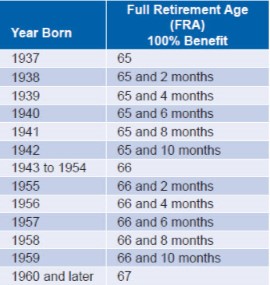One of the many parts of Social Security that is misunderstood is the Spousal Benefit. The Spousal Benefit is an alternative for those that have not worked long enough to accrue Social Security benefits (40 quarters), or may only be eligible for a small benefit based on their work history. From age 62 through full retirement age a spouse has the option of taking their own earned benefit, or opting for one half of their spouse's benefit. This benefit is permanently reduced by up to 32.5% if you elect to start drawing it at age 62. This works out to a reduction of 25/36 of one percent for each month before "full" retirement age, up to 36 months. If the number of months exceeds 36, then the benefit is further reduced 5/12 of one percent per month.

Another key part to the Spousal Benefit is that your spouse must apply for or "turn on" their benefit in order for you to receive it. In the past, a strategy called "File & Suspend," was used to trigger the spousal benefit while still delaying and accruing the working spouse's benefit. However, this loophole was closed by the Bipartisan Budget Act of 2015.
Another common question related to spousal benefits is where do they go if you get divorced? If you have been married for 10 years or longer, you will still be eligible for a spousal benefit. However, your ex-spouse will need to turn on their benefit for you to become eligible. If they have not applied, you can still qualify if they are eligible to receive the benefits and you have been divorced for 2 or more years. If your ex-spouse remarries, your spousal benefit is not affected. If you remarry, then generally you can not collect on your former spouse's record.
What happens to my benefit if my spouse passes away? The simple answer is that you will now have what is called a Widow/Widower Survivor's Benefit which will be equal to what your spouse was receiving. You will no longer receive the one half spousal benefit, but instead will step up to the larger amount. The Survivor's Benefit can also be turned on as early as age 60.
Let's say you have a wealthy single friend with a terminal disease who has months to live. Can you marry this friend and then cash in on their Social Security Benefit when they kick the bucket? The first rule of the Spousal/Survivor's Benefit is that you must be married 9 months or longer to obtain it. If you are married less than 9 months, then your spouse must have been reasonably expected to have lived 9 months or longer, or have died from an accident. The Survivor's Benefit can also be contingent on whether you stay single. If you remarry before the age of 60, you cannot collect a Survivor's Benefit on your deceased spouse unless your later marriage ends for any reason. For a full list of all the rule nuances you can visit: https://www.ssa.gov/OP_Home/cfr20/404/404-0335.htm.
Who knew marrying for money could be so complicated?




